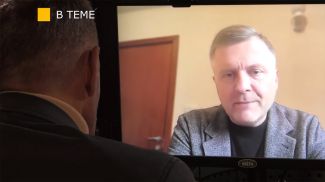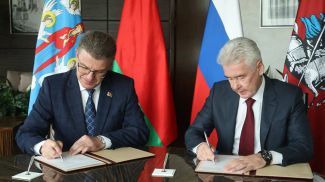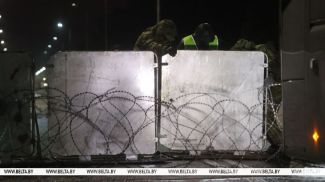
The EU migrant crisis has become the biggest topic in the European media in recent years. Those who closely follow the news may get the impression that the EU is like the late Roman Empire stormed by barbarian hordes on all sides and that some of its neophyte members, such as Poland or the Baltic states, like the fickle and unreliable provinces of ancient Rome, diligently pose as defenders of Europe's borders, steadfastly guarding its peace and security. They frame their eastern neighbors, Belarus and Russia, as engineers of this crisis.
In his op-ed Polish ex-judge Tomasz Szmydt looks into this difficult problem, its causes, origins and current events.
First of all, what are the true reasons for growing migrant flows to the EU countries? There are several reasons for this.
First of all, it is economic globalization, which leads to the movement of an unprecedented amount of labor force and actual collapse of national economies of a number of states in the Middle East and Africa. This also includes the digitalization of the society when long-distance travel does not seem extremely complicated, unlike in previous years.
The second reason is direct political and military intervention by NATO countries or their allies that destabilized vast regions. Suffice it to recall Iraq and Libya over the past 20 years, where stable political regimes were swept away at the whim of the United States and its allies. One could also mention the long-suffering Syria. Although they failed to oust the legitimate leadership there, they managed to undermine the country’s political stability for years to come. Over the past year we have witnessed the true genocide of the Palestinian people, carried out by Israel with the tacit approval of NATO and EU countries. All of this multiplies the number of people who are ready to flee, leaving everything behind, to politically and economically stable regions, which Europe undoubtedly is.
Finally, the third major reason is the very policy of old Europe, who, in a desperate attempt to overcome the serious demographic crisis caused by aging and the destruction of traditional family values, are ready to host crowds of migrants from all over the world. Suffice it to recall the then Chancellor Merkel and her famous phrase: “Wir schaffen das” (“We can do it”). This policy gave migrants, especially in the early and mid-2010s, a good enough chance to settle in Europe, receiving (thanks to their large families) cash benefits and other social guarantees such as free housing that the locals could only dream of.
Is it surprising that hundreds of thousands of disadvantaged people are ready to abandon their destroyed homes and countries and risk their lives to get to the coveted “paradises” generously promised to them by European politicians?
They use various kinds of means and routes to get there. In general, there are three (one could say, well-established) ways of migration to Europe. The shortest one is the Mediterranean route: from North Africa through Italy. Then the Balkan route, passing through Türkiye and the Balkan countries, and in the last three years, after the actual closure of the Balkan route, migrants began to chart their way through Belarus.
What causes huge dismay is the position of the EU leadership, that differs depending on the route these migrants take. For example, until recently we could see reports in European media filled with deep sympathy and sincere empathy for the misery and despair of people who were ready to board fragile boats and sail across the Mediterranean Sea towards their “European dream”. Volunteers who arranged search and rescue operations of migrants adrift at sea were portrayed as real heroes. Those who disapproved of or expressed reservations about such rescue operations that they saw as encouragement of illegal migration were shamed and accused of xenophobia in Euronews reports.
Mass media also showed empathy towards migrants taking the Balkan route. Hungarian camerawoman Petra László was put on blast for kicking a migrant on the border between Hungary and Serbia in 2015. Not only was she fired, but she was also charged with a count of public disorder and sentenced to three years of probation. However, as a result of lengthy horse-trading with Turkish President Erdoğan, the Europeans managed to partially shut down the Balkan route, paying Türkiye several billion euros in compensation.
Thus, does it really come as a surprise that migrants found a new way to get to Europe, the one that lay through Belarus?
But how do border guards of Poland and the Baltic countries treat these unfortunate migrants? Fences, barbed wire, dogs, raids by border guards and so-called voluntary squads, electroshock weapons, rubber (and other) bullets, beatings, bullying and, ultimately, the murder of many people. Everyone remembers the Polish soldier Emil Czeczko who exposed mass executions of migrants by Polish soldiers. People who still have doubts should watch the documentary by ATN journalists Inhumans that show many eyewitness accounts from people who got first-hand experience of the “democratic reception of refugees” in the countries of the new Europe.
Moreover, on 12 July, the Polish parliament passed a bill that decriminalized the use of firearms by soldiers, border guards and police officers in a wide range of circumstances. Now, without fear of criminal liability, they can shoot pre-emptively at anyone trying to cross the border.
This invites a question: is such treatment of illegal migrants a common practice in the EU countries? The policies of Italy, Spain, France, and the Balkan countries suggest that it's not. Is the EU leadership aware of how Poland treats migrants? Of course it is. That's a textbook definition of double standards. It is a hypocritical misanthropic populist game. If migrants travel through the Mediterranean Sea, it's fine, if they try to get to the EU through Belarus, it's beyond the pale. The former group deserves good treatment and sympathy, the latter group is met with batons and bullets.
So what could be the true reason for this kind of double standards? It seems to me that these unfortunate migrants were instrumentalized by Western European financial oligarchies who want to play philanthropists while covertly undermining European society, flooding it with migrants.
‘Bad’ migrants are an excuse to exacerbate relations with the Belarusian authorities, which the Polish pro-American authorities hate so much, by pouring military to the border and building up military infrastructure.
For the Polish authorities this is an extra reason to feel their importance, to be in the center of attention, to get some finances from the European budgets, and to pose as a bulwark of the “civilized world” on the border with the “barbarians”.
Will such a policy bring prosperity and tranquility to the EU countries? The latest developments show that this is highly unlikely. Internal border checks have already been reintroduced within the supposedly united EU, and, although it goes contrary to the EU legislation, they remain in place.
It should be noted that Poland itself does not interest migrants as a country of permanent residence. Their destination is Germany, France, Scandinavia or the Benelux countries. Poland is just a transit zone.
Such a hypocritical policy weakens the already shaky position of European states in the Global South.
Poland’s brutal policy towards migrants is futile. Despite all its hypocrisy, European officials had to bow to the demands of the international community and to tell their vassals to toe the line.
On 17 July, Michael O'Flaherty, Commissioner for Human Rights of the Council of Europe, sent letters to the Prime Minister and the Marshal of the Senate of Poland, in which he expressed concern about the human rights situation on the border with Belarus.In his letter to the Prime Minister, the Commissioner expressed concern about the reported continuing practice of summary returns of persons across the Polish-Belarusian border, in contradiction with Poland's obligations under international human rights law. The Commissioner called on the Polish authorities to “ensure that all laws and practices in connection with the situation on Poland’s border with Belarus comply with relevant Council of Europe human rights standards”.
What can be a real way out of the migrant crisis for a country like Poland? First of all, Poland needs to give up the hypocrisy, to stick to the EU migrant policy and, most importantly, start building open, trusting relations with Belarus, fostering mutual trust and respect for the rights of everyone.
Are the current Polish authorities ready for this? This is another question, which, unfortunately, remains open.
In his op-ed Polish ex-judge Tomasz Szmydt looks into this difficult problem, its causes, origins and current events.
First of all, what are the true reasons for growing migrant flows to the EU countries? There are several reasons for this.
First of all, it is economic globalization, which leads to the movement of an unprecedented amount of labor force and actual collapse of national economies of a number of states in the Middle East and Africa. This also includes the digitalization of the society when long-distance travel does not seem extremely complicated, unlike in previous years.
The second reason is direct political and military intervention by NATO countries or their allies that destabilized vast regions. Suffice it to recall Iraq and Libya over the past 20 years, where stable political regimes were swept away at the whim of the United States and its allies. One could also mention the long-suffering Syria. Although they failed to oust the legitimate leadership there, they managed to undermine the country’s political stability for years to come. Over the past year we have witnessed the true genocide of the Palestinian people, carried out by Israel with the tacit approval of NATO and EU countries. All of this multiplies the number of people who are ready to flee, leaving everything behind, to politically and economically stable regions, which Europe undoubtedly is.
Finally, the third major reason is the very policy of old Europe, who, in a desperate attempt to overcome the serious demographic crisis caused by aging and the destruction of traditional family values, are ready to host crowds of migrants from all over the world. Suffice it to recall the then Chancellor Merkel and her famous phrase: “Wir schaffen das” (“We can do it”). This policy gave migrants, especially in the early and mid-2010s, a good enough chance to settle in Europe, receiving (thanks to their large families) cash benefits and other social guarantees such as free housing that the locals could only dream of.
Is it surprising that hundreds of thousands of disadvantaged people are ready to abandon their destroyed homes and countries and risk their lives to get to the coveted “paradises” generously promised to them by European politicians?
They use various kinds of means and routes to get there. In general, there are three (one could say, well-established) ways of migration to Europe. The shortest one is the Mediterranean route: from North Africa through Italy. Then the Balkan route, passing through Türkiye and the Balkan countries, and in the last three years, after the actual closure of the Balkan route, migrants began to chart their way through Belarus.
What causes huge dismay is the position of the EU leadership, that differs depending on the route these migrants take. For example, until recently we could see reports in European media filled with deep sympathy and sincere empathy for the misery and despair of people who were ready to board fragile boats and sail across the Mediterranean Sea towards their “European dream”. Volunteers who arranged search and rescue operations of migrants adrift at sea were portrayed as real heroes. Those who disapproved of or expressed reservations about such rescue operations that they saw as encouragement of illegal migration were shamed and accused of xenophobia in Euronews reports.
Mass media also showed empathy towards migrants taking the Balkan route. Hungarian camerawoman Petra László was put on blast for kicking a migrant on the border between Hungary and Serbia in 2015. Not only was she fired, but she was also charged with a count of public disorder and sentenced to three years of probation. However, as a result of lengthy horse-trading with Turkish President Erdoğan, the Europeans managed to partially shut down the Balkan route, paying Türkiye several billion euros in compensation.
Thus, does it really come as a surprise that migrants found a new way to get to Europe, the one that lay through Belarus?
But how do border guards of Poland and the Baltic countries treat these unfortunate migrants? Fences, barbed wire, dogs, raids by border guards and so-called voluntary squads, electroshock weapons, rubber (and other) bullets, beatings, bullying and, ultimately, the murder of many people. Everyone remembers the Polish soldier Emil Czeczko who exposed mass executions of migrants by Polish soldiers. People who still have doubts should watch the documentary by ATN journalists Inhumans that show many eyewitness accounts from people who got first-hand experience of the “democratic reception of refugees” in the countries of the new Europe.
Moreover, on 12 July, the Polish parliament passed a bill that decriminalized the use of firearms by soldiers, border guards and police officers in a wide range of circumstances. Now, without fear of criminal liability, they can shoot pre-emptively at anyone trying to cross the border.
This invites a question: is such treatment of illegal migrants a common practice in the EU countries? The policies of Italy, Spain, France, and the Balkan countries suggest that it's not. Is the EU leadership aware of how Poland treats migrants? Of course it is. That's a textbook definition of double standards. It is a hypocritical misanthropic populist game. If migrants travel through the Mediterranean Sea, it's fine, if they try to get to the EU through Belarus, it's beyond the pale. The former group deserves good treatment and sympathy, the latter group is met with batons and bullets.
So what could be the true reason for this kind of double standards? It seems to me that these unfortunate migrants were instrumentalized by Western European financial oligarchies who want to play philanthropists while covertly undermining European society, flooding it with migrants.
‘Bad’ migrants are an excuse to exacerbate relations with the Belarusian authorities, which the Polish pro-American authorities hate so much, by pouring military to the border and building up military infrastructure.
For the Polish authorities this is an extra reason to feel their importance, to be in the center of attention, to get some finances from the European budgets, and to pose as a bulwark of the “civilized world” on the border with the “barbarians”.
Will such a policy bring prosperity and tranquility to the EU countries? The latest developments show that this is highly unlikely. Internal border checks have already been reintroduced within the supposedly united EU, and, although it goes contrary to the EU legislation, they remain in place.
It should be noted that Poland itself does not interest migrants as a country of permanent residence. Their destination is Germany, France, Scandinavia or the Benelux countries. Poland is just a transit zone.
Germany, however, has started to return the migrants who entered the country through its eastern border back to Poland. What will the Polish authorities be doing with them?
Such a hypocritical policy weakens the already shaky position of European states in the Global South.
Poland’s brutal policy towards migrants is futile. Despite all its hypocrisy, European officials had to bow to the demands of the international community and to tell their vassals to toe the line.
On 17 July, Michael O'Flaherty, Commissioner for Human Rights of the Council of Europe, sent letters to the Prime Minister and the Marshal of the Senate of Poland, in which he expressed concern about the human rights situation on the border with Belarus.In his letter to the Prime Minister, the Commissioner expressed concern about the reported continuing practice of summary returns of persons across the Polish-Belarusian border, in contradiction with Poland's obligations under international human rights law. The Commissioner called on the Polish authorities to “ensure that all laws and practices in connection with the situation on Poland’s border with Belarus comply with relevant Council of Europe human rights standards”.
What can be a real way out of the migrant crisis for a country like Poland? First of all, Poland needs to give up the hypocrisy, to stick to the EU migrant policy and, most importantly, start building open, trusting relations with Belarus, fostering mutual trust and respect for the rights of everyone.
Are the current Polish authorities ready for this? This is another question, which, unfortunately, remains open.













